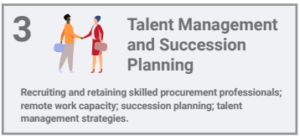The number three priority on NASPO’s 2024 top 10 priorities for state procurement is talent management and succession planning. This should come as no surprise, as it was the number-one priority in 2023.
Talent management and succession planning have been a continuous priority for public procurement for good reason. In January 2024, there were 900,000 government job openings, with state and local government job openings making up 752,000 of those.[1]

Last year, we explored “The Case of the Missing Worker” and offered a few work-focused strategies to help with recruitment for open positions. One potential solution mentioned was to reclassify job requirements to expand the applicant pool of candidates beyond just those with a 4-year degree. It turns out that this approach, known as skills-based hiring, has grown in popularity over the past few years and offers several potential benefits to public procurement offices.
The Benefits of Skills-Based Hiring
There are several key advantages to implementing a skills-based hiring approach. The non-profit organization Opportunity@Work has identified five major benefits:
- Access to a larger talent pool
- Increased diversity
- Better quality hires
- Higher retention rates
- A more resilient workforce[2]
By removing commonplace degree and experience requirements, public procurement offices have the opportunity to dramatically increase the size of their applicant pool and find the best fit for the opening. Degrees often serve as a proxy indicator of competency, but skills-based approaches identify the direct requisite capabilities necessary for satisfactory job performance, which individuals without a certain degree can also possess. It is worth noting that skills-based hiring is not an attempt to devalue degrees. Rather, it’s a reflection of the shortage of workers with degrees and credentials and the pressing need to fill vacant positions.
How to Successfully Utilize Skills-Based Hiring
The first step to implementing a skills-based hiring approach is to adjust the language used in a job opening posting. However, changes to boilerplate job requirements must be made intentionally and strategically. For example, “It involves analyzing the job, breaking it down into desired competencies, and then describing what each competency means for the job. Bucketing skills into required (must-have on day 1) and preferred (will provide on-the-job training to develop) can also offer candidates the clarity they need to apply for a position confidently.”[3]
In addition, new research conducted by Harvard Business School and The Burning Glass Institute suggests that simply changing the wording on job postings is often nowhere near enough to fully embrace skills-based hiring. The study suggests, “To hire for skills, firms will need to implement robust and intentional changes in their hiring practices – and change is hard…”[4] However, the study does find that government entities tend to outperform private firms when it comes to successfully adopting skills-based hiring practices that result in better employee retention rates. Thus, public procurement offices should be encouraged to consider this innovative approach to hiring, given its initial success in government entities.
The Future of Skills-Based Hiring
State governments have played a key role in advancing skills-based hiring in the public sector and are poised to continue to do so. For example, “Over the past year and a half, Governors in more than a dozen states have taken intentional steps to remove barriers to employment in the public sector by removing unnecessary bachelor’s degree requirements.”[5] In addition, the National Governors Association (NGA) supports a Skills in the States Community, which is a group focused on innovation to address workforce shortages and consists of almost half of the states that will meet this month to discuss best practices.
Lastly, it is worth noting that the Universal Public Procurement Certification Council (UPPCC) offers a no-degree option for its Certified Professional Public Buyer (CPPB) certification. This means that there is a clear path forward for public procurement offices to embrace skill-based hiring with the potential of professional development available for those without degrees.
Check out this Pulse Podcast to hear more on this topic!
Resources
[1] https://www.bls.gov/news.release/jolts.nr0.htm
[2] https://opportunityatwork.org/wp-content/uploads/2023/09/STARs-Business-Case-for-Skills-Based-Hiring.pdf
[3] https://www2.deloitte.com/us/en/insights/industry/public-sector/skills-based-hiring-crucial-for-government-workforce-planning.html
[4]https://static1.squarespace.com/static/6197797102be715f55c0e0a1/t/65cc355c4935cb001349a4cd/1707881822922/Skills-Based+Hiring+02122024+vF.pdf
[5] https://www.nga.org/projects/skills-based-hiring-in-the-public-sector/

